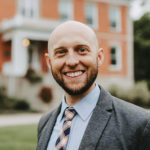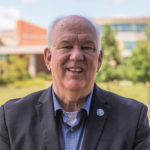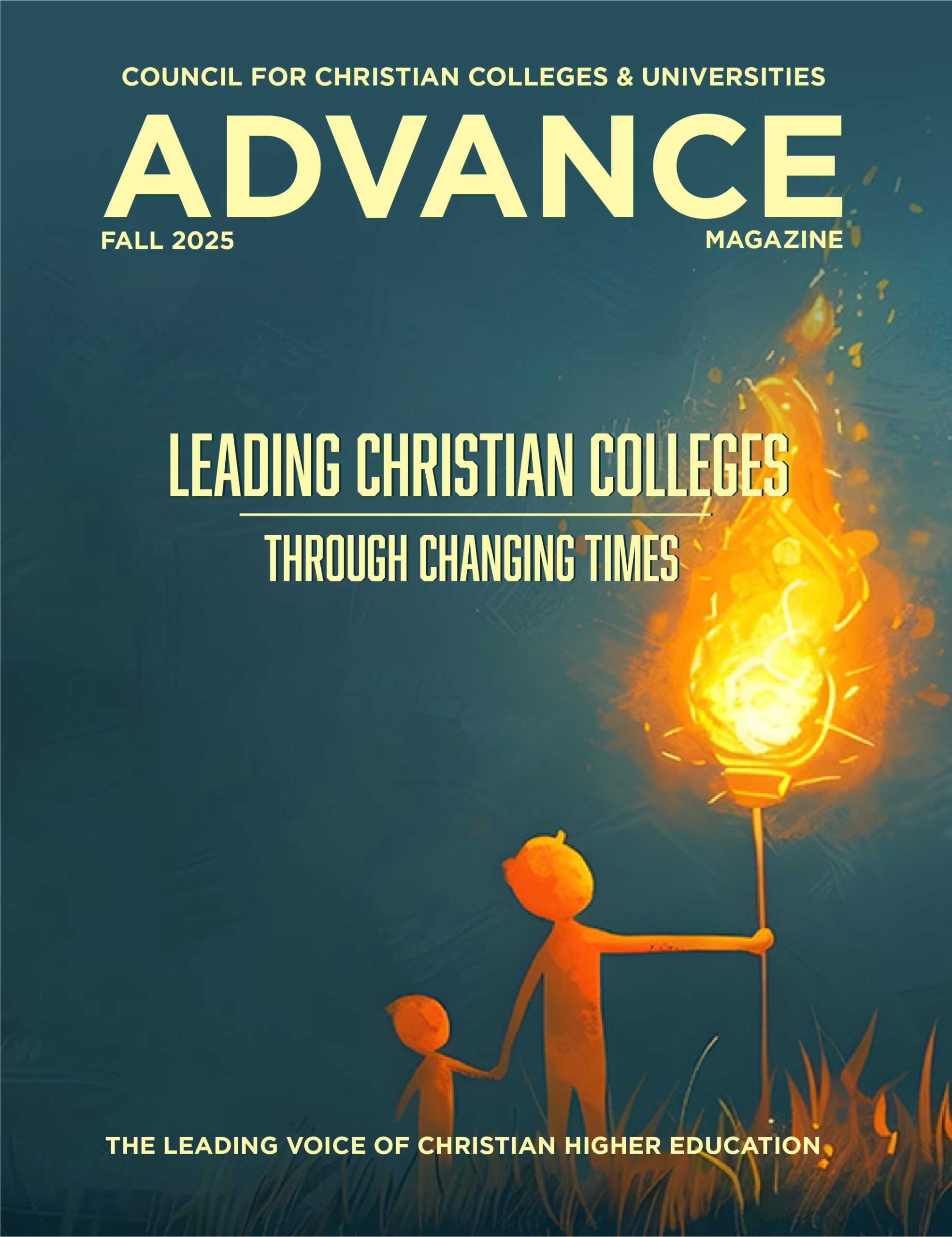Magazine
Though the CCCU is an effective and respected advocate for Christ-centered higher education, there is no more powerful advocacy than leaders and students themselves engaging their elected representatives. This face-to-face interaction gives lawmakers firsthand examples of the world-changing value of Christian higher education, which enriches the diversity of higher education nationally and internationally through institutions who educate whole persons created in God’s image.
However, knowing where to begin building these connections and how to navigate such relationships during times of political turmoil can be both challenging and intimidating. The following collection of essays by CCCU campus leaders provides examples of how advocacy work benefitted each of their institutions and offers concrete lessons to keep in mind in your own advocacy work.
 My First Visit to Capitol Hill
My First Visit to Capitol Hill
By Jay Barnes
It was January 2009, and I was incredibly nervous. Would we be stopped by security as we entered the buildings? What should we say when we entered the office suite? Would our member of Congress be interested in what we would say?
Would we know the answers to questions she might ask? These were the thoughts running through my head as my wife and I made our first visit to Capitol Hill during my first year as president of Bethel University. We were in D.C. as part of the CCCU Presidents Conference. Although we had been prepped with important information and given leave-behind materials at the conference, we had no idea how the meeting would actually work. As we entered Representative Betty McCollum’s office for the first time, we quickly realized that we were part of a long line of people who would be making a pitch to her that day. What would help our pitch be remembered?
When it was our turn to enter the office, we realized that Representative McCollum was human, interested in us, and committed to higher education. She often notes that she has more colleges and universities in her district than any other member. She is a graduate of one of Minnesota’s private colleges, and she knows the colleges in her district are distinct and important.
With one eye on the clock, she asked about our agenda and quipped, “I’m from the federal government, and I’m here to help!” She introduced us to her chief of staff, Bill Harper, as her legislative aide, Rebecca Taylor, took notes. It was the first of many visits we have had with her team. Little did we know how important that first contact would be.
About three years later, we received a letter from the Department of Education. It seemed ominous – and when I handed it to our CFO, I could see the color drain from her face. By mistakenly including our pension liability as a one-year obligation in our financial reliability composite score, we went from a high 2 to below 1 in one year. When we tried to address the mistake, we had no success in getting anyone in the Department of Education to pay attention to us – until we reached out to Representative McCollum. I was glad that it was not our first visit!
The fact that Representative McCollum knew me by name and knew Bethel, thanks to the previous meetings I’d had with her office, made all the difference. She arranged a meeting with the undersecretary of education, three of the undersecretary’s key staff members, the ranking member of the House Committee on Education and Labor, our auditors, our CFO, and me. Although it took more time than I wished, we eventually resolved our issue. Representative McCollum was vital to that process.
Bethel’s story proves that cultivating relationships with our elected leaders at the federal and state levels is important. You might not agree with your leaders on every issue, but you want them to know your name, to recognize you in an airport, and to know what matters to your university. Showing up for their local events is key to cultivating this kind of relationship. Finding ways to include them in your campus events can also be helpful.
Sometimes, God provides unexpected opportunities to deepen these relationships. When Al Franken was one of our senators, he and I were scheduled to take the same Delta flight to D.C. We were boarded and ready to go when Delta’s computer system crashed. We exited the plane, not knowing how much time we would be waiting. Although I had been in Franken’s office several times, I sensed I was not on his radar. This seemingly inconvenient event provided an opportunity to change that dynamic. I wanted him to know about the CCCU and Bethel’s commitment to immigrants, refugees, and DACA students. So as we sat waiting for information about our travel schedule, I listened to him do a good Bernie Sanders imitation, and he listened to me talk about the part of our faith commitment that resonated with him. When we finally got to D.C. later in the week, he knew something about me and Bethel when I visited his office.
So, what are my takeaways from visiting the “hallowed halls”? First, our members of Congress are very dedicated people – and very busy people. While there may be some glamour associated with the job, they fly coach, have packed schedules, sacrifice sleep and family time, and make decisions every day that will anger some and bring joy to others.
Second, it is important that they know Christian college and university leaders. We never know when we will need their help. Building a relationship with them improves the odds of them coming to our aid.
Third, their staff members really matter. If staff members understand the issue, they are often the ones who will follow through on the details. Treating them with respect is vital.
Finally, our CCCU government affairs team does great work in preparing us for those 15-minute windows of opportunity to make our case on Capitol Hill. The relationships they have formed with key staffers open doors on the big issues that allow us to carry out our Christ-centered missions. They deserve our prayers, our encouragement, and our investment.
For those looking forward to a first visit to Capitol Hill, it’s an adventure you will enjoy. Some members are more curmudgeonly than others, but most are welcoming and eager to serve. Those of us who have been there before are glad to share what we have learned along the way. After all, no matter what campus we’re from, we’re on the same team in advancing the cause of Christ-centered higher education!
JAY BARNES is the president of Bethel University in St. Paul, Minnesota, and chair of the CCCU Board of Directors.
Navigating the Illinois Map Grant Crisis
By Mark D. Kahler
Trinity International University resides in Illinois, America’s sixth-most-populous state, which recently went more than two years without a budget.
To be precise, Illinois had no official, approved state budget from July 1, 2015, until Aug. 31, 2017. For those keeping score, that amounts to 793 days of limbo in a state that already had the 50th-ranked bond rating even before the budget standoff ensued.
During this time, essential services received funding on credit, while hundreds of line items deemed “nonessential” existed in crisis mode. One “nonessential” was a longstanding college financial aid program – the Monetary Award Program, more commonly known as “MAP Grants.”
A financial aid staple in Illinois since 1967, these annual awards hinge on financial need. MAP Grants only go to students enrolled at Illinois-based public and private institutions, who use the money exclusively for tuition bills. About 120,000 students are eligible in a given year, and they receive roughly $400 million, an average of about $3,300 per recipient.
In the grand scheme of five-figure annual college costs, $3,300 might seem trivial. But for many low-income families, financial aid packages are tightly stacked.
MAP Grant credits appear on student accounts each fall, and the state settles with institutions the following spring. During the budget standoff, there were no such payments. Illinois schools wound up covering the differences from budgets that in many cases were already tight.
At the height of the budget standoff, schools approached their representatives in Springfield, seeking relief. Leaders at Trinity International University discovered a sad fact: Many state lawmakers representing our home turf knew very little about TIU’s mission or student body.
TIU’s mailing address is Deerfield, on Chicago’s affluent North Shore. The campus location actually is the small but wealthy village of Bannockburn, a place where multimillion-dollar estates spread within walking distance of campus.
Thus, lawmakers never connected what they saw as a very wealthy dot on a map to the larger MAP Grant crisis. They expressed genuine surprise when they learned of the budget squeeze at TIU due to the loss of MAP Grant funding. Most did not know TIU welcomes many first-generation college families, or that nearly all TIU students receive financial aid.
Though the MAP Grant funding gap never threatened TIU’s operating status, we had learned several key lessons by the end of the crisis:
- Connect with government leaders before a crisis starts. When they simply work from assumptions based on geography and perceived mission, understanding becomes elusive at best.
- Reassure students with financial need that they are valued, and that the institution has their best interests at heart. Remove all doubt from their minds early in the crisis.
- Help lawmakers understand that educating first-generation students and those from low-income families is a key component of your institution’s mission. They usually appreciate these needs but frequently fail to associate them with Christian higher education.
With more crises possible in the years ahead, it pays to make connections now. Help government leaders understand the distinctive nature of your institution’s Christ-centered mission.
MARK D. KAHLER is vice president for university communication at Trinity International University in Deerfield, Illinois.
 When Free Tuition Comes Knocking
When Free Tuition Comes Knocking
By Ryan Spear
In the 2016 election cycle, “tuition-free” or “debt-free” college plans featured prominently at the national level. While the results of that election quieted – or at least delayed – talk of “free college” at the federal level, in January 2017, the state of New York announced, somewhat unexpectedly, a “tuition-free” college plan for middle-class families at every two- and four-year state public institution. Though New York was the first to announce such a plan, it is not alone. Currently, over half of the states have enacted or are considering enacting free tuition or have extensive scholarship programs in place, according to the bi-partisan nonprofit The Campaign for Free College Tuition.
As a small private college in western New York with approximately 50 percent of our applicants coming from in-state, how did Houghton respond and what have been some of the lasting lessons learned?
Timing was a key factor for the first lesson. The announcement occurred with little to no advance knowledge at a key point in the admission recruitment cycle, when financial aid conversations with prospective students and families were at their height. This meant we had to respond to the proposal quickly with clear internal talking points – and not just admission counselors, but our marketing department as well.
Key to this response was improving our nimbleness of strategy development and execution, as well as a willingness to experiment and view this challenge as an opportunity to learn. In the first few months after the announcement was made, we piloted a state-run aid initiative, enhanced messaging for in-state students, and launched a broad marketing campaign focused on the promises of the lasting value and impact of a Houghton College education.
In the time since that announcement was made, we’ve recognized a number of other lessons as we’ve learned, grown, and adapted to our changing recruitment landscape:
- Anticipate the direct and indirect For example, directly, the new program introduced more direct competition; indirectly it contributed to shaping the overall conversation about cost/value, regardless of whether a student had been considering an in-state public option.
- Balance a data-centric approach with front-line input from key stakeholders.
- Know your messaging – externally and internally – and collect and communicate compelling outcomes. When delivering messaging, highlight core strengths that serve to indirectly challenge the state program (e.g. your graduation rates, time to completion, etc.). Also remember that leading students and parents through a “Socratic method” set of key questions they should ask them- selves can be just as if not more impactful than a “compare/contrast” list (but have these answers ready for when they do ask the right questions).
- Differentiate your messaging and value proposition based on particular student segments; don’t assume all students and families will respond similarly to a particular message. Remember why different student segments choose your institution. Have a bias toward action based in analysis and gather the right people around the table. Include key stakeholders across departments and levels of responsibility who bring a diversity of perspectives and personalities.
- Don’t go it alone – work with private sector partners. A key partner for Houghton is the Commission on Independent Colleges and Universities in New York (CICU). We found this was also an opportunity to build rapport and “social capital.”
- Build relationships with policy influencers and associations before crises arise. Regularly engage with local, state, and national legislators and invite them to campus to speak and interact with students. Additionally, cultivate a network of colleagues across the entire private sector through attending annual meetings of your state private college and university association.
Of vital importance, have a student-centric approach and look for “win-win” opportunities rather than engaging in an “us vs. them” approach. For instance, at Houghton, we collaborated with our private- sector peers to focus on student choice and to promote the value and diversity of higher education opportunities. The temptation is to fall into simply critiquing the state’s policies rather than to consistently speak positively about your own institution’s policies and core strengths and distinctions. Go for what makes your school look best and look different. For Houghton, it was a call to return to the mission – offering a high-quality Christ-centered education and producing scholar servants for lives of lasting impact.
When faced with any disruption, we must make the conscious choice to reframe the challenge as an opportunity to refine practices and to revisit the way in which the missions of our institutions continue to serve the needs of 21st-century students. With the 2020 elections on the horizon, the concept of a “free” option for college has become, as a recent article in The Atlantic framed it, “something of a prerequisite” for at least one party, which means it will be a topic of discussion for all parties. This means we have a great opportunity to more clearly define the unique value and diversity that Christian higher education provides and the lives it changes throughout the world.
RYAN SPEAR is the director of admission at Houghton College in Houghton, New York.
 Prioritizing Advocacy Without a Dedicated Staff Position
Prioritizing Advocacy Without a Dedicated Staff Position
By Carla E. Gross
Depending on the size and structure of your institution, you may not have a staff position dedicated solely to government relations or public affairs. At Messiah College, while government relations is part of what I do, it’s not my primary role. Ironically, even though Messiah is located just 12 miles from the state capital city of Harrisburg, we do not have a designated government relations or public affairs position.
As a result, these functions (compliance with state employment and other laws, liaison with Pennsylvania Department of Education, financial aid issues, pursuing state grants, etc.) are decentralized into various positions across the institution, while our president, Dr. Kim Phipps, builds relationships with state-elected officials.
This decentralization can be tricky, but we’ve figured out some strategies for making this work effectively that might be helpful for other CCCU institutions without a public affairs officer.
- Make sure your entire team can make a compelling, data-driven case for the contributions your institution makes in your state. Through ongoing conversations with legislators, the media, and other external stakeholders, we’ve often experienced misunderstanding about what Christian colleges are – or are not. This is particularly true for those who do not share a Christian worldview. As a result, we have had to work harder with legislators, the media, and the public to break through some of these stereotypes and share the specific story of Messiah College and the contributions made by our employees, students, and alumni. One way we have done this is through an investment in an economic impact study for our institution. We shared the results through a new page on the Messiah website, “Promoting the Common Good“. The study found that Messiah contributes more than $310 million to Pennsylvania’s economy each year. We have nearly 13,000 alumni and more than 900 employees working in the Commonwealth. Data like this is hard to ignore, and it has been invaluable to us in communicating concretely the impact that Messiah – and its Christ-centered mission – makes in our state.
- Build intentional, proactive relationships with legislators and influencers before a controversy strikes. There are a couple of ways that this can be done, depending on your institution’s structure. One is to invite state legislators and elected officials to serve on the President’s Advisory Council or another leadership advisory board, if you have one. At Messiah, President Phipps provides our government guests some time on each agenda to provide a constituent update. While they’re on campus, she also connects them with students and invites them to speak in classes. This provides mutually beneficial, two-way communication between legislators and our campus community. Another way is to leverage senior administrators’ key roles with state educational associations. For Messiah, that includes groups like the Association for Independent Colleges and Universities of Pennsylvania (AICUP), which organizes annual forums with college presidents and state legislators. While AICUP doesn’t necessarily engage or prioritize religious liberty the same way that the CCCU does, it provides networking connections with state legislators so that President Phipps and other senior administrators can help inform and shape their perspectives about Messiah and these broader issues.
- Connect and build relationships with your alumni who serve in office themselves or are in key staff positions with elected officials. Leverage the help of your development and alumni and parent relations folks – they know everybody! And don’t forget to tap your politics faculty who are following the careers of their students. You can also invite alumni to have lunch with your president, speak to students in class, or be part of a panel about careers in politics or public service.
- Invite state legislators to your key campus events or other programs. These can include such events as presidential inaugurations, centennial or other milestone celebrations, facility dedications, and high profile concerts or lectures. You can also invite them to tour or visit some of your campus’s key educational programs. For example, we had a state senator representing our district who worked as a nurse prior to her legislative career. She was very open to coming to campus to tour our nursing labs and speak to our nursing students about their future vocation.
- Most importantly: Involve your students. Connecting legislators with your students helps them understand what your institutional mission is truly about and the amazing character of your students and graduates.
CARLA E. GROSS is executive director of marketing and communications and special assistant to the president for communication at Messiah College in Mechanicsburg, Pennsylvania.




